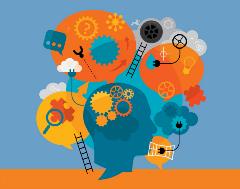Use Critical Thinking to Enhance Personal Wellness
 We are living in a time of uncertainty. Due to the rapid pace of scientific discovery and innovation, we have to constantly stay on our toes and reassess what we think we know. Furthermore, while we can find everything about anything in the blink of an eye, the limitless flow of information can be overwhelming and confusing. As a result, we can wind up more anxious and less assured.
We are living in a time of uncertainty. Due to the rapid pace of scientific discovery and innovation, we have to constantly stay on our toes and reassess what we think we know. Furthermore, while we can find everything about anything in the blink of an eye, the limitless flow of information can be overwhelming and confusing. As a result, we can wind up more anxious and less assured. As dedicated healthcare professionals, we know how important it is to keep our minds and bodies healthy. We know that we need to include physical movement, a wholesome diet, rest and intellectual stimulation in our daily regimens. Perhaps it’s now time to consider critical thinking as a component of an overall personal wellness program as well.
To think critically, we must do three things: identify assumptions, apply reasoning and generate multiple perspectives. Critical thinkers set aside preconceived notions and reconsider baseline assumptions. Critical thinkers draw conclusions using logic and the best available evidence. They keep an open mind and remain fair-minded. Critical thinkers do not accept information blindly but rather process new information utilizing inquiry and reasoning.
How can critical thinking enhance personal wellness?
Critical thinking is a social activity. We cannot think critically in a void. There is no way to challenge our own opinions and perspectives without considering those of others. To facilitate critical thinking, we must surround ourselves not only with like-minded people, but, even more importantly, with those who do not share our worldviews. While it is validating to listen to those who agree with our opinions, hearing and then thinking critically about perspectives that are new or different from ours allows us to broaden our horizons. Challenging our own assumptions offers the option of appreciating perspectives that we previously would not have considered, allowing us to accept differences with more tolerance and understanding.
Critical thinking allows us to effectively curate information to support our decisions. In dental school, we learned how to identify the best available evidence. We can use the same skills to help us sort through the mounds of information that we receive, regardless of the topic. Is the source credible? Is the logic sound? If the data are scientific in nature, were studies properly conducted to support the conclusions? When different perspectives are vying for our attention and acceptance, rather than automatically aligning ourselves with one or the other, we can use our critical thinking skills to synthesize what we learn about the different perspectives and come up with our own. When our decisions are supported by research and evidence, we can feel more confident in them.
Critical thinking can be transformative. We can often get stuck in the stories we tell ourselves. Critical thinking can liberate us from these stories by illuminating the assumptions that shape our reality, providing us with the ability to challenge those assumptions and thereby transforming our reality. In other words, critical thinking helps us see things in a new light and facilitates new possibilities, which, in turn, offers hope.
In 2017, Heather Butler, assistant professor of psychology at California State University, surmised that critical thinking “has been associated with wellness and longevity.” She further asserted that “critical thinkers experience fewer bad things in life.”1 While blind acceptance of Butler’s statements would substantiate the claims we’ve made in this article, we challenge our readers to think critically about those claims. We offer Butler’s pearls hoping that any interested readers will perform the necessary research and spend time considering and discussing the notion with others, including those who have differing opinions. In other words, we hope that our readers will reduce uncertainty by utilizing critical thinking to derive conclusions in which they can feel confident, grounded and, perhaps, hopeful.
Ivy D. Peltz, DDS, MSEd, PhD, MAGD, is retired from private practice in New York City. Eric S. Studley, DDS, is the president and CEO of Eric S. Studley & Associates, an insurance brokerage company specializing in the insurance and financial needs of dentists. They are both retired from academic positions at the New York University College of Dentistry. Together, they co-founded Doccupations, the dental career services component of Eric S. Studley & Associates. To comment on this article, email impact@agd.org.
Reference
1. Butler, Heather. “Why Do Smart People Do Foolish Things?” Scientific American, 3 Oct. 2017, scientificamerican.com/article/why-do-smart-people-do-foolish-things/. Accessed 10 Dec. 2021.
